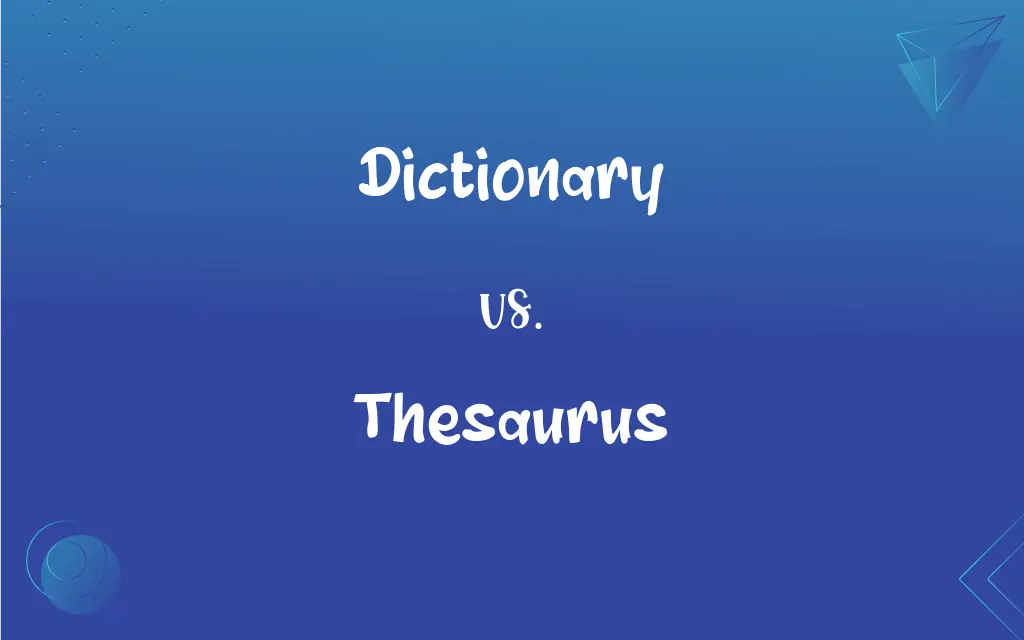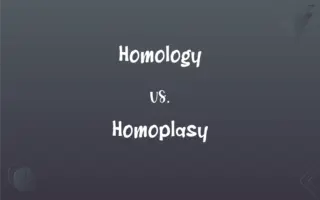Dictionary vs. Thesaurus: What's the Difference?
Edited by Aimie Carlson || By Harlon Moss || Updated on October 20, 2023
A dictionary defines words, while a thesaurus provides synonyms and antonyms.

Key Differences
A dictionary is an essential tool for anyone seeking to understand the meanings, pronunciations, and correct usage of words. It offers detailed explanations, etymologies, and sometimes even the history of a word's usage. On the other hand, a thesaurus is an invaluable resource for those looking to diversify their vocabulary. Rather than giving definitions, a thesaurus offers lists of synonyms (words with similar meanings) and antonyms (words with opposite meanings) for any given word.
The primary objective of a dictionary is clarity. When you encounter an unfamiliar word, turning to a dictionary can provide clarity about its meaning, how it's pronounced, and how it might be used in a sentence. In contrast, the primary goal of a thesaurus is variety. By consulting a thesaurus, writers and speakers can find alternate words to convey the same or a similar idea, thereby adding variety and richness to their language.
In essence, while both the dictionary and thesaurus serve language enthusiasts, they fulfill different needs. A dictionary is fundamental for comprehension, ensuring that readers and listeners can understand the meaning of a word within its context. A thesaurus, conversely, aids expression, offering options to articulate an idea in various ways.
While it's possible to use a word correctly after consulting a dictionary, it's equally crucial to understand the subtle nuances between synonyms provided by a thesaurus. Not all synonyms are entirely interchangeable, and the context can significantly affect which synonym is most appropriate. Thus, using both a dictionary and a thesaurus in tandem can ensure both clear understanding and nuanced expression.
Comparison Chart
Primary Purpose
Defines words
Provides synonyms and antonyms
ADVERTISEMENT
Usage
Understanding meanings and pronunciations
Diversifying vocabulary
Content
Definitions, pronunciations, etymologies
Lists of synonyms and antonyms
Objective
Clarity
Variety
Role in Writing
Ensuring correct word usage and understanding
Enhancing language by offering alternate word choices
Dictionary and Thesaurus Definitions
Dictionary
An online resource explaining word meanings and usage.
When in doubt, he often checks an online dictionary.
ADVERTISEMENT
Thesaurus
A guide for finding similar or opposite words.
She consulted a thesaurus to find antonyms for ancient.
Dictionary
A source providing information on a particular subject.
She referred to a medical dictionary for clarity.
Thesaurus
A book listing words grouped with their synonyms and antonyms.
She used a thesaurus to find a synonym for happy.
Dictionary
A reference book containing word meanings and details.
I looked up the word serendipity in the dictionary.
Thesaurus
An online tool providing word alternatives.
When writing essays, he often checks an online thesaurus for varied vocabulary.
Dictionary
A tool listing words of one language and their translations in another.
Her Spanish-English dictionary was invaluable during her trip.
Thesaurus
A resource assisting in enriching written or spoken content.
To make his speech more engaging, he turned to a thesaurus.
Dictionary
A compilation explaining specialized terms.
The legal dictionary clarified many complex terms for her.
Thesaurus
A reference aiding in diversifying language use.
A thesaurus is handy when trying to avoid repetitive language.
Dictionary
A reference work containing an alphabetical list of words, with information given for each word, usually including meaning, pronunciation, and etymology.
Thesaurus
A book of synonyms, often including related and contrasting words and antonyms.
Dictionary
A reference work containing an alphabetical list of words in one language with their translations in another language.
FAQs
Why might a writer consult a thesaurus?
A writer might use a thesaurus to diversify vocabulary and avoid repetitive language.
Can a thesaurus be used to understand a word's meaning?
Not directly. A thesaurus provides synonyms and antonyms but not explicit definitions.
How is a thesaurus different from a dictionary?
A thesaurus provides synonyms and antonyms, while a dictionary offers definitions and usage.
Do dictionaries only contain word meanings?
No, dictionaries can also provide pronunciations, etymologies, and usage examples.
Can a thesaurus help improve vocabulary?
Yes, regularly consulting a thesaurus can introduce a person to varied word choices and enhance vocabulary.
How often should a thesaurus be updated?
While core synonyms and antonyms remain consistent, newer versions might include modern vernacular and slang.
Are all dictionary definitions accurate?
While reputable dictionaries strive for accuracy, language is fluid, and interpretations can vary.
How do specialized dictionaries differ from general ones?
Specialized dictionaries focus on specific fields, like medicine or law, and provide terms and definitions related to that field.
Should a thesaurus be used without a dictionary?
While it's possible, using both ensures understanding nuances and using words correctly.
What is the primary purpose of a dictionary?
A dictionary's primary purpose is to define words and provide details about them.
Why are there different versions of dictionaries?
Language evolves, and new versions of dictionaries reflect updated word meanings, usage, and newly added words.
How are words added to a dictionary?
Words are added based on their frequency, widespread usage, and longevity in the language.
Can dictionaries help with pronunciation?
Yes, many dictionaries provide phonetic spellings or symbols indicating pronunciation.
How has technology impacted dictionary and thesaurus use?
Technology has made both easily accessible online, often with interactive features and frequent updates.
Are online dictionaries as reliable as printed ones?
While many online dictionaries are reliable, it's essential to ensure they come from reputable sources.
Can a thesaurus help in poetry writing?
Yes, poets often use thesauri to find words that fit rhythmically and contextually.
Is there a difference between British and American dictionaries?
Yes, some words have different meanings, spellings, or usage in British and American English.
Do all words in a thesaurus have antonyms?
No, not all words have direct antonyms.
Do all words have synonyms?
No, some words, especially specialized terms, may not have direct synonyms.
Is a thesaurus useful for non-native English speakers?
Yes, it can help them learn varied ways to express the same idea in English.
About Author
Written by
Harlon MossHarlon is a seasoned quality moderator and accomplished content writer for Difference Wiki. An alumnus of the prestigious University of California, he earned his degree in Computer Science. Leveraging his academic background, Harlon brings a meticulous and informed perspective to his work, ensuring content accuracy and excellence.
Edited by
Aimie CarlsonAimie Carlson, holding a master's degree in English literature, is a fervent English language enthusiast. She lends her writing talents to Difference Wiki, a prominent website that specializes in comparisons, offering readers insightful analyses that both captivate and inform.































































